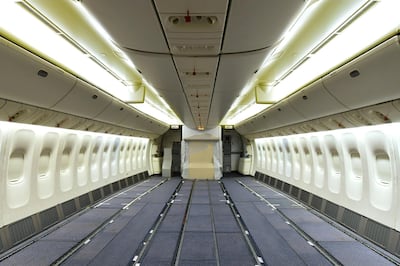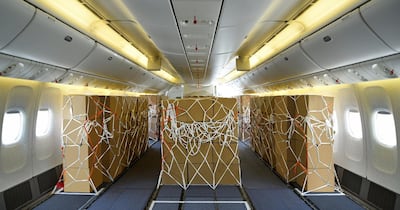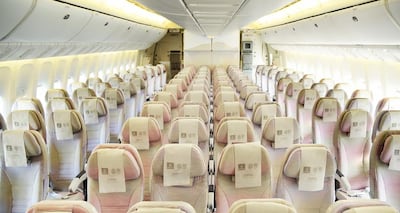Emirates has shared a behind-the-scenes look at how it's increasing its cargo capacity – by removing seats from its economy cabins.
The Dubai airline's SkyCargo arm has removed the seats in 10 of its Boeing 777-300ER aircraft to meet the strong air cargo demand across the world.
They will be used to transport essential commodities such as personal protective equipment, pharmaceuticals, medical equipment, food, machinery and other supplies around the world.
The modified economy cabins allow for 17 tonnes, or 132 cubic metres, of extra cargo capacity per flight – on top of the 40 to 50-tonne capacity in the belly hold.
Engineers are working to convert the 10 aircraft in Dubai, with each requiring almost 640 hours of work between 11 engineers for the modification. The process involves removing 305 economy seats, fixing the equipment to the floor safely, and carrying out load-bearing tests. First and business class remain untouched.
Seven aircraft have already been modified, with three more aircraft due to be ready by mid-July.

By the end of the project, the Emirates engineering team will have removed 3,050 seats. The seats will be "safely and hygienically" stored until the planes are required for passenger services, when they will be refitted into the aircraft.
Previously, extra cargo had been transported in the belly hold, as well as in overhead bins and on top of passenger seats. Removing the seats altogether is taking things one step further, Nabil Sultan, Emirates divisional senior vice president, Cargo says.

“Since the start of the Covid-19 pandemic, Emirates SkyCargo has taken very seriously its responsibility of connecting people and businesses across the world with the commodities that they urgently require. To this end, we have been working flat out, first to re-connect a global network of more than 85 destinations and then to introduce capacity options that fit what our customers demand from us."
However, Emirates SkyCargo has strict rules on the type of cargo that can be loaded inside the modified cabins. These mean the cargo will primarily be PPE, medical clothing and pharmaceuticals, and perishables such as cut flowers, and some fruits and vegetables that can be maintained within a temperature range of 15 and 25 degrees Celsius. Cargo loaded in the passenger cabins will be packed in an external container such as a plastic or cardboard box, in accordance with the latest IATA regulations.
_________________
Read more:
Flydubai resumes flights to 24 cities and aims to reach 66 destinations by end of summer
Summer travel: Where can I book a holiday?
Coronavirus: Dubai's new travel rules and testing explained
_________________

